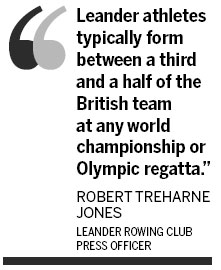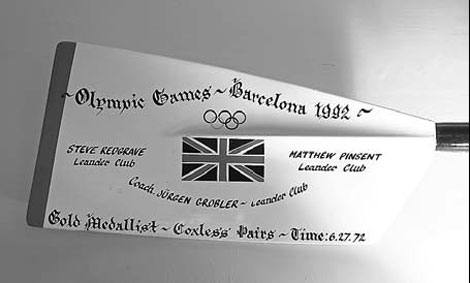Leander ready for 100th medal
Updated: 2012-04-29 07:07
(China Daily)
|
|||||||||
|
Rowers work out early in the morning on the River Thames at Henley-on-Thames, west of London, this month. Eddie Keogh / Reuters |
Traditionally strong British rowing club wants its legacy to continue on home waves
A Leander member failing to win the club's 100th Olympic rowing medal at the London Games is about as unlikely as spying a pink hippopotamus winging its way through the Henley skies. Of course, those wanting a glimpse of such an unnatural beast can always find it in the many drawings and sculptures of the Leander mascot on display inside the Victorian clubhouse.
Leander's oarsmen - and women since 1998 - have delivered medals by the boatload in more than a century of Olympic endeavor and are all set to bag another haul on home water this summer.
Just one more is needed for the ton.
A wealth of nations, about 80 in all from Albania to Yemen by way of the Seychelles and Somalia, have never won an Olympic medal of any sort but, with less than 100 days to go until the Games start, the club has its place on the podium as good as reserved.
While Team GB has yet to confirm the crews for London, the line-up announced for the first World Cup regatta of the season next month has 27 Leander rowers in it - half of the total.
So far 99 Olympic medals have been draped around the necks of the club's rowers in the only sport Britain has unfailingly struck gold in at every Games since 1984.
"Even if you take away the individual medals and do it simply by crew then GB Rowing, of which Leander is a major part, would still have more medals than most countries over the years," press officer Dr. Robert Treharne Jones said in the 19th century clubhouse with its idyllic views over the Thames from the Berkshire side.
"Leander athletes typically form between a third and a half of the British team at any world championship or Olympic regatta," said the rowing writer, broadcaster and club member.
The list of British Olympic greats to have competed in Leander's pink colors include Steve Redgrave, who won five gold medals in five successive Games and four-time champion Matthew Pinsent.
The actor Hugh Laurie, who rowed for Eton and Cambridge, is also a member as was his late father, Ran, a 1948 Olympic gold medalist.
The lunch menu in the well-appointed clubhouse offers belt-busting "crew specials" for those following in such giant footsteps along with fine dining for less gargantuan appetites.
In the ground-floor gym, a functional space a world away from the memorabilia and gilded memorials covering the upstairs walls, a simple banner reminds the current crop of hopefuls what they must live up to once the Games start on July 27.
"Welcome to Leander's gym," it declares. "The home to 13 Olympic medalists in Beijing 2008."
Leander had 15 athletes in Beijing as part of the GB rowing team and all reached the finals, winning three gold medals, seven silver and three bronze.
Olympic gold

Individual names are on the wooden panels of the honors board in the lobby, a display at least 3m long, but time and space is running out even for them.
Despite its size, the current panels go back only as far as 2004, such is the rate of success at Olympics, world championships and the annual Henley Royal Regatta which ranks alongside Ascot and Wimbledon as highlights of the British summer social calendar.
Older boards are moved upstairs to join a collection of shields dating back to 1840, about 22 years after the first recorded existence of the club whose founders were known without hyperbole as 'The Brilliants'.
There are oars suspended overhead, some of them used in previous Olympics, while a staircase up to the 11 guest rooms sponsored by the likes of Harvard, Yale, Oxford and Cambridge, climbs past portraits of past presidents - many of them in brass-buttoned blazers.
The black and white photographs in the members' bar of late Victorian and early 20th century crews winning the Regatta's Grand Challenge Cup could almost have been taken yesterday, so little has changed outside.
Ironically, there is only one Olympic medal on display - a 1908 gold tucked away in the corner of a dining room in a cabinet made from the remains of an old boat and won by the late Charles Desborough Burnell, whose son Dickie also won Olympic gold in the 1948 double sculls.
"The (1908) final was Leander versus the Belgians. And it was rowed out there," said Treharne Jones, gesturing at the broad stretch of river flowing beyond the towpath.
"On the progress board, the top one said Leander and the bottom one said Belgium."
At the 1912 Stockholm Games, the Leander eight won gold again after beating a crew from New College, Oxford. Sidney Swann was the only man in the Leander boat not to have attended Oxford University.
In Antwerp in 1920, Leander had to settle for silver after losing to an American eight.
The 1948 Olympic rowing events were held on the river at Henley, a well-heeled town so steeped in the sport that passengers arrive at the train station on the Regatta Line, but the Games now require still water and purpose-built six-lane courses over 2,000m.
This year's Olympic regatta will be held at Eton Dorney lake, near Windsor.
"We are not an ordinary rowing club," Treharne Jones recognized. "You can't come and knock on the door and say 'I'd quite like to learn to row' and give it a stab.
"Having said that, we do teach people to row. We take guys from other sports who we think have potential if they can just be taught to row. We bring people like that into our development academy, swimmers, basketball players ..."
To do that takes money, 400,000 pounds ($633,800) a year to fund the development program with 270,000 pounds raised by membership subscriptions and the rest having to be generated through clubhouse activities and from sponsors.
The club can accommodate 75 athletes, but half of them will be in the Team GB setup and train at nearby Caversham.
The boathouse, (built in 1896), contains stacks of yellow Empacher racing shells, the German-made Rolls Royce of rowing, with each eight costing between 25,000-30,000 pounds.
"Most ordinary clubs could only dream of an Empacher," explained Treharne Jones. "Our entire fleet is made up of them."
In the old days, the club was very much a haven for gentlemen from the great British public schools, such as Westminster and Eton, and Oxford and Cambridge universities. The memorial board in the clubhouse to fallen members in both World Wars reads as a list of officers.
Leander remains elitist even now, but on sporting excellence rather than class or education. Pinsent went to Eton, but Redgrave attended a state comprehensive in nearby Marlow.
The club's name, harking back to the Greek myth of the amorous Leander who drowned while swimming the Hellespont to be with his lover Hero, derives from a type of 19th century boat.
The star and the arrow, which feature in the full coat of arms, were also types of six-oared cutters that had clubs named after them in London where Leander was also founded.
Reuters in Henley-on-Thames, England
|
A decorated rowing blade is seen at the Leander club. Eddie Keogh / Reuters |
(China Daily 04/29/2012 page11)

